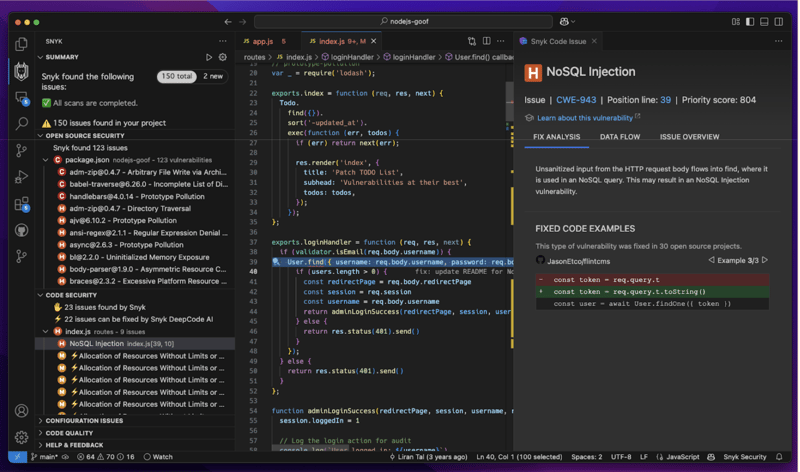Errors as values (Go)
How Go's error handling is better In many programming languages like java and javascript, errors are special.They are handled using fancy syntax like try and catch statements but often end up becoming messy or confusing. Here is an example a file copying program written in javascript: const fs = require("node:fs") const { argv } = require("node:process") try { const data = fs.readFileSync(argv[2], "utf-8") fs.writeFileSync(argv[3],data) } catch (err) { console.error(err) } In the above program we try to read a text file whose name is provided as an stdin argument to the program and write its contents to a second file whose name is also provided as the second argument The problem in this program is that we do not know where the error occured, was it the readFileSync function that returned an error? or was it writeFileSync? The error could be anything. We could try and handle errors using callbacks forexample: fs.readFile(argv[2], "utf-8",(err, data)=>{ if (err){ console.error(err) } fs.writeFile(argv[3], data, err=>{ console.log(err) }) }) but this approach quicky leads to callback hell when working with multiple risky functions. However when it comes to Go, we are forced to think about the errors returned on each step of the way. Here is the same program now written Go. package main import ( "log" "os" ) func main() { data, readErr := os.ReadFile(os.Args[1]) if readErr != nil { //do something with the read error log.Fatal(readErr) } writeErr := os.WriteFile(os.Args[2], data, 0600) if writeErr != nil { //do something with the write error log.Fatal(writeErr) } } We handle errors as any other value by checking if they are equivalent to null or nil in Go's case. This provides clarity as to where the errors are coming from and also allows more flexibility in handling those errors.

How Go's error handling is better
In many programming languages like java and javascript, errors are special.They are handled using fancy syntax like try and catch statements but often end up becoming messy or confusing.
Here is an example a file copying program written in javascript:
const fs = require("node:fs")
const { argv } = require("node:process")
try {
const data = fs.readFileSync(argv[2], "utf-8")
fs.writeFileSync(argv[3],data)
} catch (err) {
console.error(err)
}
In the above program we try to read a text file whose name is provided as an stdin argument to the program and write its contents to a second file whose name is also provided as the second argument
The problem in this program is that we do not know where the error occured, was it the readFileSync function that returned an error? or was it writeFileSync? The error could be anything.
We could try and handle errors using callbacks forexample:
fs.readFile(argv[2], "utf-8",(err, data)=>{
if (err){
console.error(err)
}
fs.writeFile(argv[3], data, err=>{
console.log(err)
})
})
but this approach quicky leads to callback hell when working with multiple risky functions.
However when it comes to Go, we are forced to think about the errors returned on each step of the way. Here is the same program now written Go.
package main
import (
"log"
"os"
)
func main() {
data, readErr := os.ReadFile(os.Args[1])
if readErr != nil {
//do something with the read error
log.Fatal(readErr)
}
writeErr := os.WriteFile(os.Args[2], data, 0600)
if writeErr != nil {
//do something with the write error
log.Fatal(writeErr)
}
}
We handle errors as any other value by checking if they are equivalent to null or nil in Go's case. This provides clarity as to where the errors are coming from and also allows more flexibility in handling those errors.


.jpg)

























![[Webinar] AI Is Already Inside Your SaaS Stack — Learn How to Prevent the Next Silent Breach](https://blogger.googleusercontent.com/img/b/R29vZ2xl/AVvXsEiOWn65wd33dg2uO99NrtKbpYLfcepwOLidQDMls0HXKlA91k6HURluRA4WXgJRAZldEe1VReMQZyyYt1PgnoAn5JPpILsWlXIzmrBSs_TBoyPwO7hZrWouBg2-O3mdeoeSGY-l9_bsZB7vbpKjTSvG93zNytjxgTaMPqo9iq9Z5pGa05CJOs9uXpwHFT4/s1600/ai-cyber.jpg?#)












































































































































![[The AI Show Episode 144]: ChatGPT’s New Memory, Shopify CEO’s Leaked “AI First” Memo, Google Cloud Next Releases, o3 and o4-mini Coming Soon & Llama 4’s Rocky Launch](https://www.marketingaiinstitute.com/hubfs/ep%20144%20cover.png)





























































































































![[FREE EBOOKS] Machine Learning Hero, AI-Assisted Programming for Web and Machine Learning & Four More Best Selling Titles](https://www.javacodegeeks.com/wp-content/uploads/2012/12/jcg-logo.jpg)








































































![Rogue Company Elite tier list of best characters [April 2025]](https://media.pocketgamer.com/artwork/na-33136-1657102075/rogue-company-ios-android-tier-cover.jpg?#)








































































_Andreas_Prott_Alamy.jpg?width=1280&auto=webp&quality=80&disable=upscale#)






























































































![What’s new in Android’s April 2025 Google System Updates [U: 4/18]](https://i0.wp.com/9to5google.com/wp-content/uploads/sites/4/2025/01/google-play-services-3.jpg?resize=1200%2C628&quality=82&strip=all&ssl=1)










![Apple Watch Series 10 Back On Sale for $299! [Lowest Price Ever]](https://www.iclarified.com/images/news/96657/96657/96657-640.jpg)
![EU Postpones Apple App Store Fines Amid Tariff Negotiations [Report]](https://www.iclarified.com/images/news/97068/97068/97068-640.jpg)
![Apple Slips to Fifth in China's Smartphone Market with 9% Decline [Report]](https://www.iclarified.com/images/news/97065/97065/97065-640.jpg)
































































































































